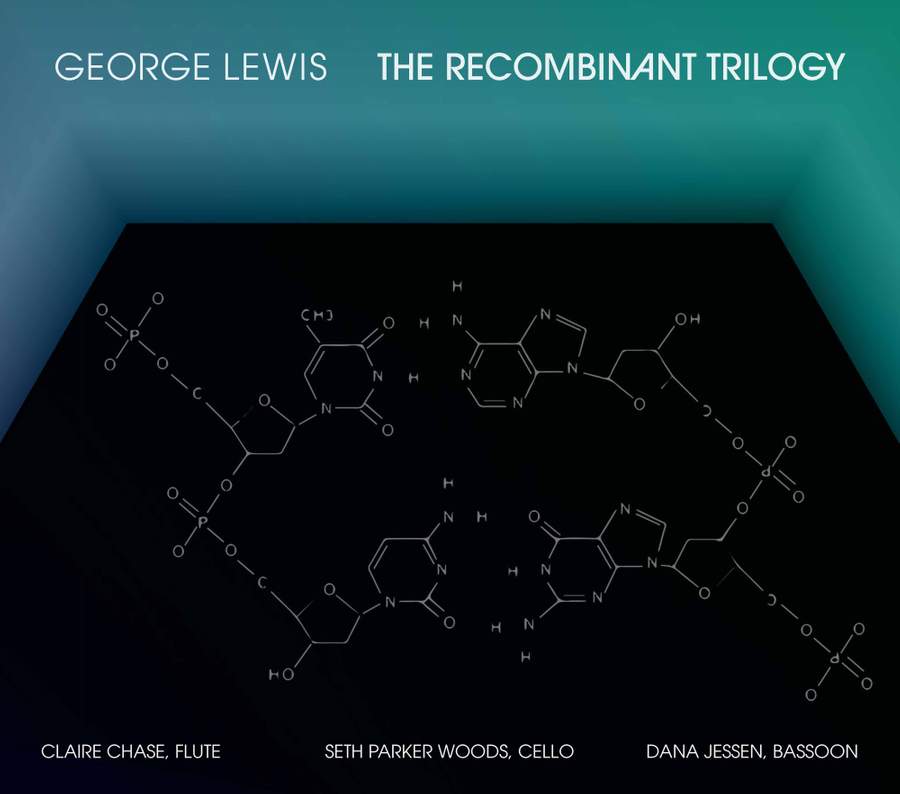LEWIS The Recombinant Trilogy
View record and artist detailsRecord and Artist Details
Genre:
Chamber
Label: Focus Recordings
Magazine Review Date: 06/2021
Media Format: CD or Download
Media Runtime: 59
Mastering:
DDD
Catalogue Number: FCR284

Tracks:
| Composition | Artist Credit |
|---|---|
| The Recombinant Trilogy |
George Lewis, Composer
Claire Chase, Flute Dana Jessen, Bassoon Eli Stine, Electronics Levy Lorenzo, Electronics Seth Parker Woods, Cello |
Author: Liam Cagney
Professor of Music at Columbia University and a pioneer of interactive computer music, George Lewis made news recently with his well-considered VAN article ‘New Music Decolonization in Eight Difficult Steps’, which resonated in the broader post-BLM environment. ‘There is no reason why major music institutions that tout themselves as international should continue to present all-white programs’, he noted.
The psychedelic ‘Recombinant Trilogy’ comprises three recent works for solo instrument and electronics. Each explores ways in which Max electronics can exaggerate or transform the solo instrument. Works are structured as plateaus of interaction between instrument and electronics. This formal approach – sequential rather than developmental – ensures that there’s always something unforeseen around the corner, and that as listeners we stay engaged. A highlight is the virtuoso performance by Claire Chase, Seth Parker Woods and Dana Jessen, which rewards repeated listens.
Emergent for flute and electronics opens with Chase playing repeated high notes; soon the sounds begin multiplying, swirling, dipping and diving. We’re not sure of what’s the original flute and what its electronic copies, but we can pleasure in the sound. Disorientation is intentional, a pretext for adventures into new sound zones. Elsewhere there’s more straightforward contrapuntal dialogue between actual and virtual, and elements of dialogue, too, with tradition (echoes of Varèse). More strident, Not Alone for cello and electronics is dedicated to cellist Abdul Wadud of the Black Artists Group of St Louis. Its opening features long, weaving atonal lines high up the cello’s neck which eventually become a cascade, before transforming into staccato harmonics and col legno.
Seismologic for bassoon and electronics in places reminds me of the Boulez of Dialogue de l’ombre double, but more generous. Multiphonic tremolandos and fast up-and-down chromatic runs, repeated à la John Coltrane, are joined by ghostly pitch-shifted doppelgängers; soon, the doppelgängers are so altered that they don’t resemble the bassoon at all but rather babbling animal voices. Lewis has a keen sense for pacing, and contrast always arrives at the right moment.
Discover the world's largest classical music catalogue with Presto Music.

Gramophone Digital Club
- Digital Edition
- Digital Archive
- Reviews Database
- Full website access
From £8.75 / month
Subscribe
Gramophone Full Club
- Print Edition
- Digital Edition
- Digital Archive
- Reviews Database
- Full website access
From £11.00 / month
Subscribe
If you are a library, university or other organisation that would be interested in an institutional subscription to Gramophone please click here for further information.




